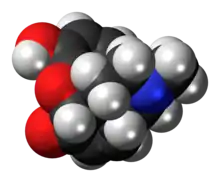Morphinone
Morphinone is itself not a very potent opioid but it is the intermediate when morphine is being converted to hydromorphone (trade name Dilaudid) which is 4–6 times as potent as morphine.
 | |
 | |
| Names | |
|---|---|
| IUPAC name
(5α)-3-Hydroxy-17-methyl-7,8-didehydro-4,5-epoxy-morphinan-6-one | |
| Identifiers | |
CAS Number |
|
3D model (JSmol) |
|
| ChEBI | |
| ChEMBL | |
| ChemSpider |
|
| ECHA InfoCard | 100.006.714 |
PubChem CID |
|
| UNII | |
CompTox Dashboard (EPA) |
|
InChI
| |
SMILES
| |
| Properties | |
Chemical formula |
C17H17NO3 |
| Molar mass | 283.32 g/mol |
Except where otherwise noted, data are given for materials in their standard state (at 25 °C [77 °F], 100 kPa).
Infobox references | |
Chemical structure
Morphinone can be described as the ketone of morphine.
Legal status
Morphinone itself is an active opioid although its potency is closer to codeine than morphine. It is, however, an important precursor and would fall under the purview of the Controlled Substances Act within the United States. Its legal status in other countries varies.
References
Opioid receptor modulators | |
|---|---|
| MOR |
|
| DOR |
|
| KOR |
|
| NOP |
|
| Unsorted |
|
| Others |
|
This article is issued from Wikipedia. The text is licensed under Creative Commons - Attribution - Sharealike. Additional terms may apply for the media files.